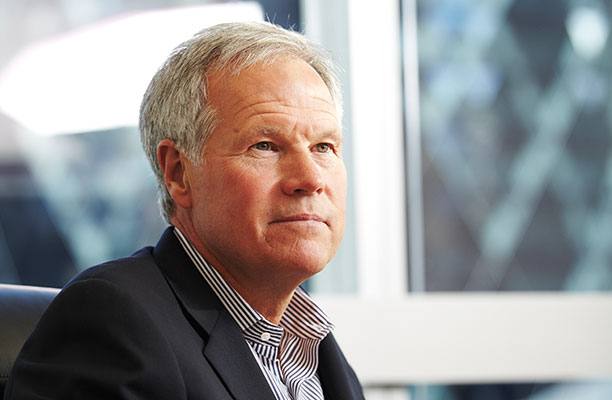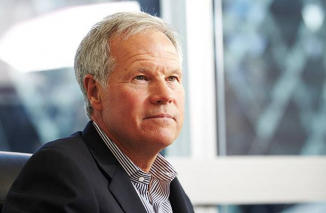Latham & Watkins and William H Voge are fortunate in one regard. The looking-glass glaze that appears when law firms are embroiled in newspaper-selling scandal typically inflates status to make a so-so story look better. ‘Top lawyer involved in….’ stories usually translates as ‘someone you’ve never heard of at a mid-tier firm you rarely think about’.
In this case, Latham benefits that the significance of the departure of Voge is so strong in the industry that general coverage will inevitably underplay it. With respect to the Magic Circle, for years now Latham has been firmly established as the world’s most influential and potent global law firm. That status was underlined earlier this year when the world’s highest-billing legal practice became the first to cross the $3bn mark, a distinction that only a few years back a London-bred law firm looked certain to achieve.
From there the shock value only piles up. For one, Latham had long been famed for having one of the most inclusive and progressive environments in Big Law. Even as #MeToo-related stories of abusive and harassing behaviour piled up, no one was expecting Latham & Watkins to be centre of the next revelation.
And Voge was a highly-regarded figure, who you will see cited as a strong leader in a piece when the next issue of Legal Business hits desks. He had excelled through a lengthy career at the firm that had seen him at the forefront of taking Latham well beyond its Californian heartlands (and being instrumental in launches in New York, Germany, London and the Middle East). A peer of influential figures such as former head Bob Dell and high-yield pioneer Bryant Edwards, Voge was for years one of the highest billers in Latham’s energy and projects team, one of the firm’s twin engines along with its much vaunted leverage business.
He was appointed following an exhaustive seven-month process to replace Latham’s veteran head Dell – who was probably the most celebrated US law firm leader to have emerged since the 1980s. That process initially drew no fewer than 36 candidates.
Voge only threw his hat in when New York chief David Gordon – viewed by many as Dell’s heir apparent – ruled himself out. In the end the veteran went into a final run-off against two younger US-based partners, Paul Sheridan and Jeffrey Greenberg.
The London-based Voge’s selection in 2014 came partly on the back of his avowed globalism (a continuation of Dell’s legacy) and a promise to serve only one five-year term, which would give time for further grooming of next generation leadership.
Since Voge formally took the role of chair and managing partner in January 2015, it had appeared that Latham could do no wrong, making further inroads in Europe’s deal and disputes markets as its core sponsor clients boomed.
Its status as the most upwardly mobile US practice of the last 25 years looked assured – even as Kirkland & Ellis ominously represented a rival model for industry domination, the bad cop to Latham’s squeaky-clean good guy. It was a remarkable journey for a Los Angeles labour boutique launched during the Depression by two lawyers no one had heard of.
The fairy tale narrative continued, barely interrupted by something as trifling as a global banking crisis, which resulted in over 400 job losses in 2009. It continued until 20 March 2018, when Latham announced that Voge was standing down due to ‘conduct involved the exchange of communications of a sexual nature with a woman whom he has never met in person and who had no connection to the firm’.
Voge himself included a personal statement laying bare the destruction of his reputation: ‘My conduct falls well below the personal and professional standards I have tried to uphold throughout my entire career. My disappointment in myself is all the more acute because this lapse does not represent who I am and what I believe, and because I have let down our firm and its people, all of whom I so deeply cherish and respect.’
Ironically, Voge had a reputation for supporting women at Latham, though there will be some mitigation for the brand that this ‘lapse’ doesn’t involve Latham staff or clients.
Readers will inevitably wonder what sparked the resignation. There are convincing US press reports that have not been denied that cite the departure as being due to a relationship Voge had begun last autumn with a woman through a Christian group, the New Canaan Society, which he was then a board member of.
According to these accounts in Law360, the relationship later led to the exchange of texts with sexual tones and an initially consensual relationship broke down leading to a dispute as the woman began pursuing recourse against Voge through various legal and professional channels.
While there are some aspects of this account that Voge’s representatives take issue with, self-evidently Latham’s influential board took the view that his position leading the firm had become untenable.
In the meantime, Rich Trobman and Orla Fisher have been appointed as interim heads while Latham aims to fill the leadership vacuum. Initial indications are that this will happen in a matter of weeks.
The firm is stuffed with executive talent and has a powerful nine-member executive. (Dell himself had been preceded by strong leaders like Jack Walker and Clint Stevenson).
Many in Europe would see the London-based Trobman – one of the world’s top leveraged finance lawyers, a key architect of its European expansion and point-man on many of Latham’s key global hires – as a natural successor.
The brutal calculation for rivals in London as the reverberations play out is if any successor takes a less internationalist view than Voge, triggering a shift that may slow Latham’s seemingly unstoppable advance in Europe. A marginal shift is possible but any substantive pivot highly unlikely – the firm is the most thoroughly globalised of America’s top firms.
The cultural and reputational hit will be more open to debate, although the firm’s decisive response and the lack of connection between Voge’s lapses and his day job will limit much of the damage. Latham has proved itself culturally and fiscally strong enough to ride through shocks before, as seen with the 1990 collapse of its scandal-hit largest client Drexel Burnham Lambert, not to mention its post-Lehman convulsions. The initial reaction of battle-hardened peers beyond profanity-laden shock, has been that Latham will ride this out with minimal drama.
That leaves the bigger issue of the profession’s treatment of women, which is particularly pressing given a business model that hands so much power to high-status partners. If even a firm like Latham and a figure like Voge can be affected, this looks like just the tip of a very large iceberg. There will be more revelations. We’re working on some right now. The assumption until it has been convincingly refuted must be that the legal industry has a specific problem with women and abuses of power. And it’s not going away so it may as well face it.
alex.novarese@legalease.co.uk














